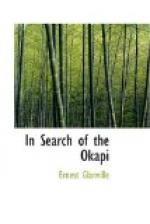He had no wish to be roasted. Once more using his knife to cut down a sheaf of stems, he made a flail of these, and beat out the fire to windward. And as he worked on the one side of the little clearing the fire grew on the other side, and then raced along, leaving behind in the blackened area many separate fires, where masses of reeds had been beaten down. And the smoke went up in a growing cloud that blotted out the sky—went up and fortunately rolled away towards the great river under the sufficient strength of the wind; otherwise he would have been suffocated. The cracking of the reeds was like rifle-fire breaking through the roar of the flames, and now and again the crashing of animals on the stampede could be heard. He looked out upon his work with awe, stood and gazed spellbound, wondering if such a sea of flame could ever be stopped, fearing that it would spread out into the bush beyond, and run up into the forest and devour every tree until stopped by the mighty river itself. As he looked, he heard some creature before him writhing in the blackened track of the fire, and presently he made it out—a great crocodile convulsively lashing its powerful tail. Going near with cautious steps, he put it out of its misery with a ball under the forearm; then he went on over the scorched ground very slowly, for the burnt reeds were like sharp stakes to the feet. And as he followed, the fire died out before him, and began to eat its way right and left, working back through the reeds against the wind. Then he heard the report of a gun, and as he stepped from the burnt area on to the short grass that had offered no fuel for the fire, something came springing around him, and before he could pull trigger it was off with a yelp into the darkness under the canopy of smoke. “Coo-ee—coo-ee! Compton—ahoy! Compton!”
Compton croaked and hobbled on.
Then the creature yelped about him again, and his friends were shaking him by the hands.
“You know,” he said with a croak, “I didn’t mean to set fire to the place.”
“Thank God, my boy, you did,” said Mr. Hume, fervently. Then he lifted the boy up in his arms.
“I can walk,” said Compton; and, to prove it, his head rolled helplessly on his shoulder.
Mr. Hume strode off to the river, and washed the layer of soot off the blackened face, laved the red eyes, and moistened the cracked lips and parched tongue. Then he gave the boy a soothing drink, rubbed oil on his feet and face; rolled him in a blanket, and carried him up to the camping-ground under the precipice.




